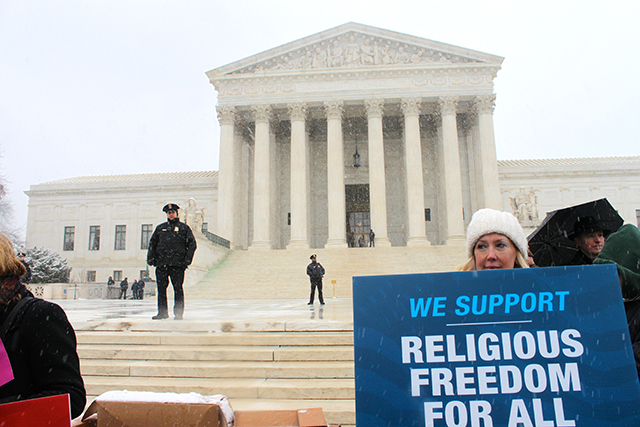How the Supreme Court Justices Reacted to Today’s Hobby Lobby Arguments
Derrick Morgan / Hans von Spakovsky / Elizabeth Slattery /
President Obama’s health care law made its way back to the Supreme Court of the United States today. In addition to being unsound health care policy by limiting patient choice and increasing costs, it also requires businesses to pay for abortion-inducing drugs. This morning, the Supreme Court heard oral argument in Sebelius v. Hobby Lobby and Conestoga Wood Specialties v. Sebelius, two challenges to the Obamacare mandate.
Hobby Lobby is an arts and crafts chain owned by the Green family, who are evangelical Christians, with over 13,000 employees. Hobby Lobby would face potential fines of almost $475 million a year if they fail to comply with this mandate. Conestoga Wood Specialties is a kitchen cabinet manufacturer run by the Hahns, a Mennonite family, with almost 1,000 employees. It would face financial penalties of about $35 million per year. Along with more than 300 plaintiffs in over 90 lawsuits, the Green and Hahn families believe that complying with the Obamacare mandate would force them to violate their sincerely held religious beliefs.
The First Amendment and the Religious Freedom Restoration Act (RFRA) protect the free exercise of religion. Under RFRA, the government may not substantially burden the free exercise of religion unless it can show that the burden advances a compelling interest using the least restrictive means of achieving that interest. That’s a high bar. At issue in this case is whether these family businesses have religious liberty rights.
The Obama Administration claims that business owners give up their right to exercise their religion when they go into business. But religious liberty shouldn’t be confined to the four walls of your home or place of worship. As First Lady Michelle Obama said in another context: “Our faith journey isn’t just about showing up on Sunday.… [I]t’s about what we do Monday through Saturday as well.” She also helpfully noted that “Jesus didn’t limit his ministry to the four walls of a church.” In fact, he was in carpentry, like the Hahn family.
Arguing for Hobby Lobby and Conestoga today at the Court was well-known Supreme Court litigator Paul Clement, who led the first challenge to Obamacare in 2012. Solicitor General Donald Verrilli appeared on behalf of the government. During the oral argument, Justices Kagan, Sotomayor, and Ginsburg seemed unmoved by Clement’s arguments. They seemed to suggest it would be no burden for an employer such as Hobby Lobby to pay a penalty to avoid the anti-conscience mandate. They intimated that a corporation could increase wages and not provide health care at all (even though Hobby Lobby has explained it provides health care to its employees as part of their desire to care for them the way God wants). If that were the case, Hobby Lobby, for example, would only face a $2,000 per employee fine, or a bit more than $25 million.
Verrilli underwent some tough questioning by Justices Scalia and Alito, as well as Chief Justice Roberts. Scalia pointed out that there was not a single decision upholding the government’s position that for-profit corporations cannot bring a free exercise claim under the First Amendment. (Verrilli had noted that no for-profit corporation had been granted relief.). The Chief Justice pointed to the contradiction of the government’s position that a corporation can bring a claim over racial discrimination yet could not bring a religious freedom claim.
Perhaps most interesting was a significant change in momentum once the Solicitor General was asked hypotheticals by Justice Alito. Alito noted that Denmark has recently banned kosher slaughterhouses. Would a for-profit corporation in the United States have standing to assert RFRA defenses in such a case here? At first trying to distinguish the case by saying the legislation would have been impermissibly targeted in that case, Verrilli ultimately admitted that such corporations would not have standing under RFRA. Justice Breyer seemed to not be completely satisfied with that result, asking specifically about five Muslim owners of a for-profit corporation. “I need a response to that question,” he said.
Paul Clement closed by emphasizing Verrilli’s response on for-profit kosher slaughterhouses, noting that he could not see how that could be the law. He also made the point that Congress itself had passed RFRA, while the anti-conscience mandate was simply an agency action by the Department of Health and Human Services. Congress should really get the last word here, he implied.
A decision in this case will likely be handed down at the end of the Court’s term in June.

